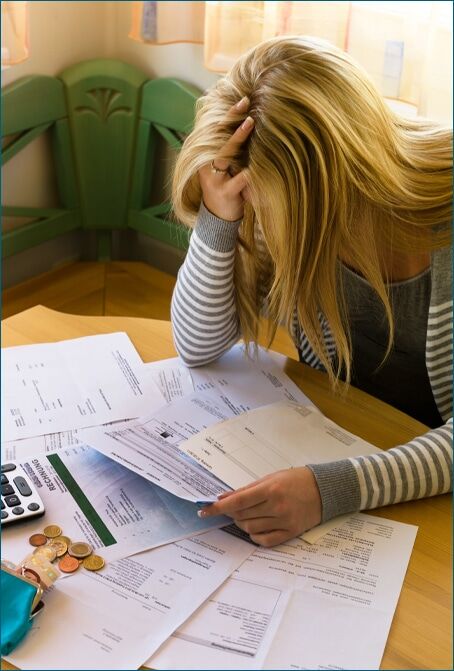Charlotte Bankruptcy and Divorce Attorneys
Providing informed guidance around divorce & bankruptcy in North Carolina
Filing for divorce is a hard choice for so many reasons. And the decision becomes even more complex if there are financial difficulties within the marriage – whether these problems are known to both spouses or don’t come out until the divorce process. If you’re facing divorce along with bankruptcy issues, don’t let the situation become overwhelming. Let us answer your questions.
The seasoned Charlotte divorce lawyers at Epperson Law Group, PLLC have seven decades of experience in family law. We can help guide you through the process with practical information that keeps the best interests of you and your children in mind. Our only goal is to get you moving on to the next chapter of your life in the best financial shape possible. Call us today.
How does bankruptcy affect a Charlotte divorce?
If you and your spouse file for bankruptcy during your divorce, the bankruptcy proceedings will put a hold on your property distribution. This is known as an “automatic stay” under Section 362 of the United States Bankruptcy Code. An automatic stay means that creditors must stop efforts to collect on debts after you file for bankruptcy. (The stay doesn’t apply for any debts incurred after filing.)
Marital assets that are part of the bankruptcy case can’t be distributed between divorcing spouses until the bankruptcy court makes a judgment. In certain instances, a court can declare a bankruptcy case “no asset,” meaning the debtor can keep their remaining assets because they all fall into state exemptions. In that case, your marital property division can proceed as normal.
Other ways bankruptcy can affect – or not affect – your divorce include:

Child support and spousal support
It’s important to remember that bankruptcy won’t stop actions for child support or spousal support. However, if the separated or ex-spouse is trying to collect against property that’s part of the bankruptcy estate, they may need to seek legal relief against the automatic stay. You may hear the court refer to child support or alimony as “domestic support obligations,” or DSOs.
Equitable property distribution
Bankruptcy’s automatic stay has the biggest impact during the property distribution portion of the divorce process. Equitable distribution is the division of assets or debt between spouses during a divorce. Any property the person who filed the bankruptcy has a financial interest in will be considered part of the bankruptcy estate and will be affected by the automatic stay – meaning property distribution will come to a halt until bankruptcy proceedings are over.
Paternity actions
Bankruptcy doesn’t stop a paternity action from being initiated or continuing.
If you and your spouse are thinking about divorce and bankruptcy, you may want to consider filing a joint bankruptcy before your divorce. Of course, every situation is unique and depends on factors like debt, assets, your income, financial history and other factors. Ensure you speak to knowledgeable Charlotte divorce and bankruptcy attorneys to be assured you understand all your options.
Can I get a divorce while going through bankruptcy?
If you are already in the middle of your Charlotte divorce and either you or your spouse file for bankruptcy, your divorce can proceed, but the automatic stay may slow down the process considerably. As we discussed earlier, during a bankruptcy, all property and assets of the debtor becomes the property of the bankruptcy estate. There are some property exemptions under North Carolina bankruptcy law, including things like motor vehicles, college savings accounts and homestead/residence.
Although it likely won’t affect other issues like child custody, alimony and child support, just keep in mind that going through bankruptcy and divorce at the same time can be time-consuming when it comes to division of assets.
Can my ex-spouse avoid paying child support by filing for bankruptcy in Charlotte? What about spousal support?
There’s a common misconception that if you successfully file for bankruptcy, you’re no longer liable for any financial obligations – including child support and spousal support. This is untrue. Bankruptcy is dealt with in federal court, while divorce actions take place in North Carolina local courts. Domestic actions like divorce and separation may continue in state courts during bankruptcy proceedings, but bankruptcy cannot discharge any domestic support obligations – these DSOs are known as non-dischargeable debts.
If you are having trouble collecting your spousal or child support, you have legal options at your disposal. Talk to the child support enforcement attorneys at Epperson Law Group, PLLC today.

What happens to our marital debt during bankruptcy?
Aside from alimony and child support, a bankruptcy court does have the power to restructure or discharge marital debt. However, this depends on whether you or your spouse seeks a Chapter 7 or a Chapter 13 bankruptcy. A Chapter 7 bankruptcy relieves an individual of all their eligible debts. Under Chapter 13, the court creates a payment plan for the individual to make payments over time, so they may keep certain assets, and then the remaining eligible debts are relieved.
What does this mean for you?
- Under Chapter 7, any property settlements and debts between spouses won’t be discharged.
- Under Chapter 13, those settlements and debts may be discharged – meaning an individual who files under Chapter 13 may be relieved of their obligation to pay off any debt distributed to them during property settlement.
- Lastly, even if you’re not the spouse who filed for bankruptcy, you may still be liable for the debt distributed to your spouse as part of the settlement if they are unable to pay. This does sound unfair, but because the lender isn’t part of the divorce, they aren’t bound by any court order when it comes to collecting debts.
If you’re concerned about how bankruptcy and divorce can affect your financial future, it’s wise to consult with skilled Charlotte divorce lawyers before moving forward.
Dependable Charlotte bankruptcy and divorce attorneys
If you’re considering divorce along with matters of bankruptcy or other financial issues, you have a lot of decisions to make. The experienced legal team at Epperson Law Group, PLLC can help. We provide knowledgeable guidance regarding separation and divorce agreements, and work with you to help ensure you start the next chapter of your life financially stable. Contact us today. Our offices are just minutes off the NC-16. To reserve a consultation with one of our lawyers in Charlotte, Boone, or Weddington, please call 704-321-0031 or fill out our contact form.
